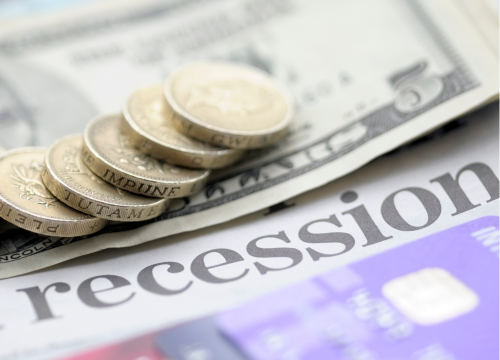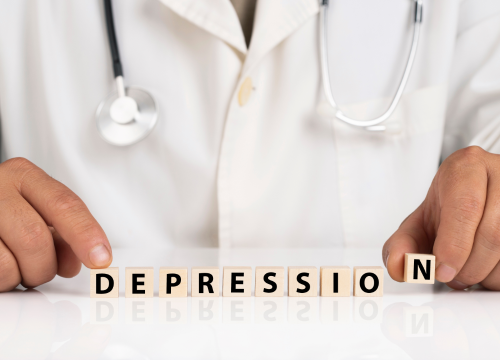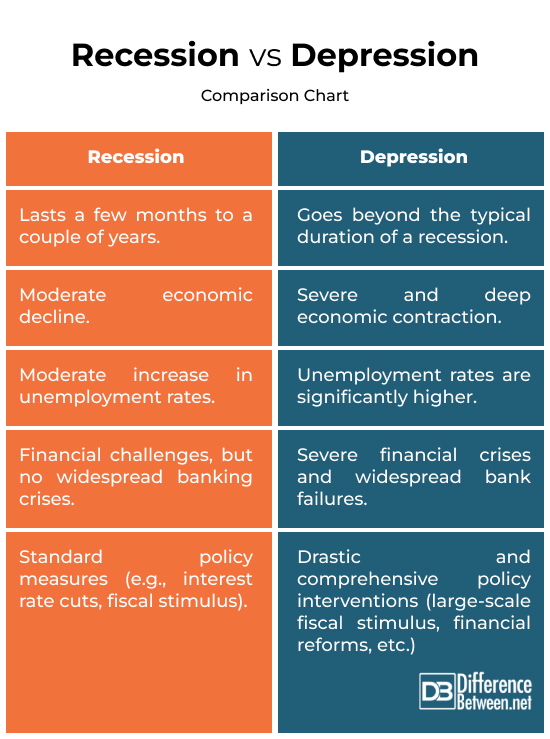The expansion or contraction of the economy is a direct result of any change in the economy. There are significant differences between the terms “recession” and “depression,” which are both used to describe periods of economic downturn. Despite the fact that both phrases are frequently employed in the context of macroeconomics, the impact that they have might vary significantly depending on the sector and the region.
In the following paragraphs, we will examine some of the most significant distinctions that exist between depression and recession.

What is a recession?
The term “recession” refers to a period of time during which there is a general decrease in economic activity across the economy. During this period, a number of things, including the gross domestic product (GDP), employment, investment spending, and consumer spending, all see a decline. The duration of recessions can vary greatly.
The length of a recession can range from a few months to several years. When a recession occurs and unemployment rates rise, it is possible that people will lose their jobs. When businesses want to save money, they could reduce the number of employees they employ or put significant initiatives on wait. Governments frequently intervene and attempt to address the situation by enacting laws that encourage economic expansion.

What is depression?
A prolonged version of a recession is what we mean when we talk of depression. A period of economic slump that lasts for an extremely extended period of time is referred to as a recession. This type of recession goes beyond the features of a recession. Over the course of a depression, the rate of unemployment is substantially higher than it is during a recession.
Depression is a condition that can be brought on by a variety of circumstances, including but not limited to financial crises, bubbles in the stock market or real estate, or big global events such as wars or pandemics.
In most cases, governments react to economic downturns by implementing policy measures that are both comprehensive and coordinated. It is possible that they will invest enormous sums of money, alter the way that money functions, and make significant adjustments to the financial system in an effort to get the economy back on track.
Difference between Recession and Depression
Intensity and Duration
Recessions are typically defined as economic downturns that are short- to medium-term in nature and span anywhere from a few months to a couple of years. A decrease in economic activity is a characteristic of this condition, however it is typically less severe than depression.
A protracted and severe economic downturn that continues for an extremely extended period of time is referred to as a depression. The duration of this recession is longer than the average duration of a recession, and it is characterized by a more profound and long-lasting loss in economic activity.
Unemployed people
During a recession, there is a possibility that unemployment rates would increase; however, this increase is often mild and may be short. The labor market often starts to recover as the economy recovers, which is a cause for concern because job losses are a concern.
In times of depression, the unemployment rate is much greater and remains elevated for an extended period of time. There has been a widespread loss of employment, and a significant number of people may have difficulty finding work for a lengthy period of time.
A Stable Financial Position
In spite of the fact that recessions might bring about difficulties in the financial sector, they almost never bring about widespread banking crises. Despite the fact that financial institutions may be experiencing stress, the banking system continues to be generally stable.
The economic downturn is frequently accompanied by major financial crises, which may include widespread bank failures. The confidence that people have in the financial system is badly damaged, and it becomes difficult for individuals and enterprises to obtain loans.
In response to policy
Changes in monetary policy, such as reductions in interest rates, and fiscal stimulus packages are examples of the types of actions that governments and central banks take in response to recession episodes. The purpose of these activities is to lessen the damage and to encourage economic recovery.
Governments often implement more thorough and extreme steps to rebuild the economy during a downturn. These initiatives include massive money injections, reforms to the financial sector, and other bold moves.
As an example
A significant example of a recession that had an effect on the entire world is the Great Recession, which lasted from 2007 to 2009. It was caused by the bursting of the housing bubble in the United States, which resulted in a financial crisis that had an effect on countries all over the world.
There has never been a more severe economic downturn in contemporary history than the Great Depression, which lasted from 1929 to 1939. The great stock market crash that occurred in 1929, in which the values of equities traded on the New York Stock Exchange plummeted, was the beginning of this phenomenon.
Recession vs. Depression: Comparison Chart

Summary
The decline of the economy is a characteristic of both recessions and depressions. Depressive episodes, on the other hand, are differentiated by the fact that they last for a longer period of time, have a significant influence on unemployment, cause financial instability, and necessitate more active policy responses. When compared to depressions, which are extremely uncommon and are indicative of the most severe economic conditions, recessions are regarded to be a typical component of the economic cycle.
FAQs
Was 2008 a recession or a depression?
The Great Recession is the term that most people use to refer to the economic crisis that occurred in 2008. Despite the fact that it was a terrible worldwide financial crisis, depressive symptoms were not present throughout this time period.
What happens during a depression?
The reduction in economic activity that is characteristic of a depression is both more severe and more long-lasting.
What happens if we go into a recession?
Following the onset of a recession and an increase in the unemployment rate, people begin to lose their jobs. To save money, businesses usually reduce the number of employees they employ and put significant initiatives on hold.
What not to buy during a recession?
When the economy is in a recession, it is important to frequently reevaluate your spending patterns. You want to steer clear of non-essential and luxury products, as well as high-end devices and expensive purchases whenever possible.
Are we in a recession in 2023?
In 2023, we were able to avoid a recession.
What would a Great Depression look like today?
An economic downturn like the Great Depression may have serious repercussions on a worldwide scale, including widespread unemployment, unstable financial conditions, and a large influence on a variety of industries. It is possible that the interconnectivity of the global economy would compound the consequences, which will result in a recovery that is delayed and difficult to achieve.
How long do economic depressions last?
Depressions in the economy can endure for a number of years, and the length of time they last can vary depending on the circumstances that caused the downturn and the success of governmental solutions. For example, the Great Depression that occurred in the 1930s lasted for close to ten years from its beginning.
How does an economy get out of a recession?
The implementation of steps to stabilize the economy during a recession is a responsibility of governments and central banks. It is possible that this will involve significant injections of money, reductions in interest rates, and policies designed to return the economy to its normal state.
- Difference Between Caucus and Primary - June 18, 2024
- Difference Between PPO and POS - May 30, 2024
- Difference Between RFID and NFC - May 28, 2024


Thanks for the articles.
Reply
AWESOME STUFF DUDE
Reply
because of the summary its easy to understand….
Reply
depression is sever and long lasting process while recession is frequently happening and is for a short period.
depression effect the whole world while recession is concerned with a specific country.
Reply
Right
Reply
I have been curious about the difference and have been searching 3 sites, then I came across yours. Your definition is much better explained. Many thanks!!
Reply
Very helpful article ..a big thank you
Reply